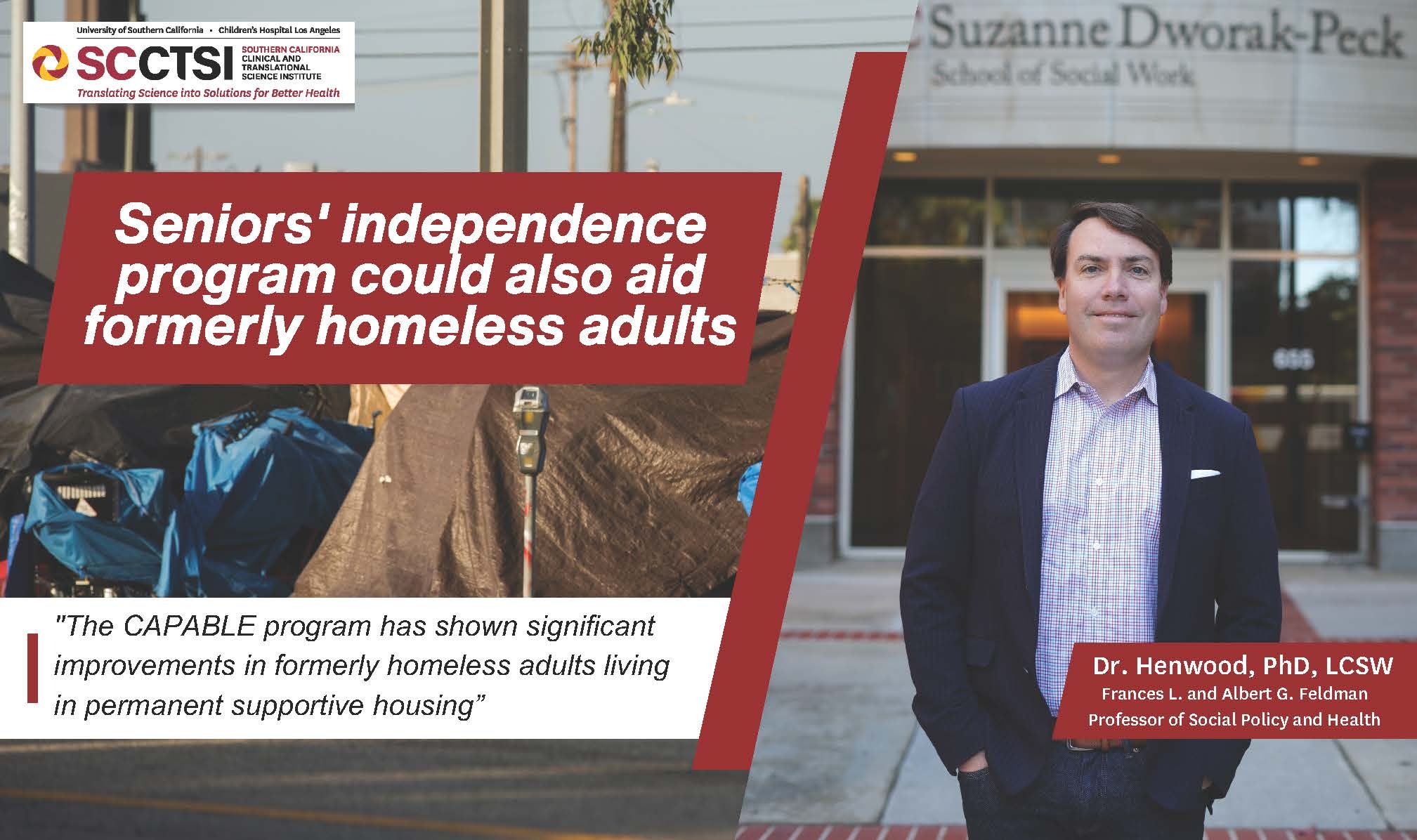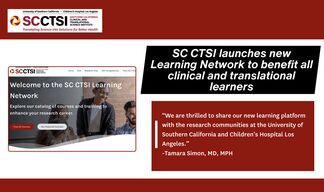Seniors' independence program could also aid formerly homeless adults
An SC CTSI-funded pilot study showed that a program helping seniors living independently could also benefit younger, formerly homeless adults experiencing accelerated aging and chronic mental health conditions.
Many older adults want to age in place, remaining independent for as long as possible. A proven, home-based program, Community Aging in Place, Advancing Better Living for Elders (CAPABLE), has helped many seniors do just that.
The CAPABLE program offers individualized action plans developed in cooperation with seniors living at home. In 10 sessions over five months, visiting occupational therapists, registered nurses and home repair specialists collaborate with people over 65 to identify strategies to stay safer and healthier. CAPABLE is not available for people under 65 or those living in Permanent Supportive Housing (PSH), which is the federally endorsed solution to homelessness. PSH offers affordable, independent housing for chronically homeless people who have left the streets, helping to improve their quality of life, and reducing public costs by placing individuals into independent community living.
However, today’s PSH services may not be adequate for many in an aging homeless population.

“When permanent support housing was designed, the average age of a chronically homeless person was in their 30s, but now the average age has risen to the mid to late-50s,” said Benjamin F. Henwood, PhD, LCSW, the Albert G. and Frances Lomas Feldman Professor of Social Policy and Health at the University of Southern California (USC). He directs the Center for Homelessness, Housing and Health Equity Research at the USC Suzanne Dworak-Peck School of Social Work and has a secondary appointment as a professor in the USC Chan Division of Occupational Science and Occupational Therapy.
“Support services that have complemented permanent supportive housing were targeted to a relatively young population,” Henwood said. “Today, the average person in PSH has experienced accelerated aging with geriatric and other conditions typically equivalent to a person in their 70s or 80s who has been continuously housed.”
People in PSH also have higher rates of chronic mental health conditions than the target population for CAPABLE.
The Southern California Clinical and Translational Science Institute (SC CTSI) has funded a pilot randomized controlled trial, led by Henwood, providing the CAPABLE program to 27 formerly homeless adults with an average age of 63 who live in permanent supportive housing and have experienced accelerated aging that could jeopardize their ability to live independently.
The study examined the impact of CAPABLE on tenants’ activities of daily living (ADLs), which include basic self-care skills such as walking, brushing teeth and eating. The study also examined the CAPABLE program’s impact on depression and instrumental ADLs (IADLs), which include more complex skills such as preparing meals and housekeeping.
The CAPABLE program in the pilot study produced significant improvements in participants compared to a waitlist control group of 30 people, according to a study in the Journal of the American Geriatric Society. The program had a positive impact on IADLs and depression, and it may have reduced the average number of falls compared to the control group, which may ultimately decrease ER visits and hospitalizations. This is the first known study to demonstrate improved outcomes for formerly homeless adults living in PSH.
The SC CTSI pilot study, completed in Los Angeles, was highlighted in a national report by the Assistant Secretary for Planning and Evaluation in the U.S. Department of Health and Human Services as an innovative program to address the challenges faced by older adults who have experienced homelessness, including difficulty accessing the kinds of assistance they need.
The CAPABLE program would require some tweaking to meet the needs of residents in permanent supportive housing since most of them have more than one mental health condition, which CAPABLE was not designed to address.
Henwood collaborated with the pilot study’s co-investigator Deborah Pitts, PhD, OTR/L, BCMH, CPRP, FAOTA, a Professor of Clinical Occupational Therapy in the USC Chan Division of Occupational Science and Occupational Therapy. She has expertise in psychiatric rehabilitation. Pitts frequently met with the program’s nurses and the occupational therapists to address challenging situations.
“Supporting providers to consider adaptations to CAPABLE that might be needed in light of the complex nature of the PSH populations was a key feature of these consultations,” Pitts said.
This included how to address the functional impact of comorbidities considering cognitive impairments and long-standing time on living unhoused.
“To extend the CAPABLE program to supportive housing, we think we need to include an important adaptation to address behavioral health,” Henwood added.
Henwood noted that the underlying philosophies of CAPABLE and a Housing First approach to PSH are similar.
“Both programs ask the older adult, ‘What do you want to accomplish? How can we help you do those things?’ This facilitates the integration of CAPABLE and PSH because both are person-centered, helping people age in place,” Henwood added.
Based on the findings of the CTSI funded pilot, Henwood has been working the Los Angeles County Department of Health Services to explore whether CAPABLE could become a systems-wide intervention available in PSH. Henwood and his study team have also applied to the National Institute on Aging to conduct a larger randomized controlled trial of CAPABLE in PSH that would examine cost-effectiveness in additional to person-centered, functional outcomes.
Watch our video interview with Dr. Henwood:



